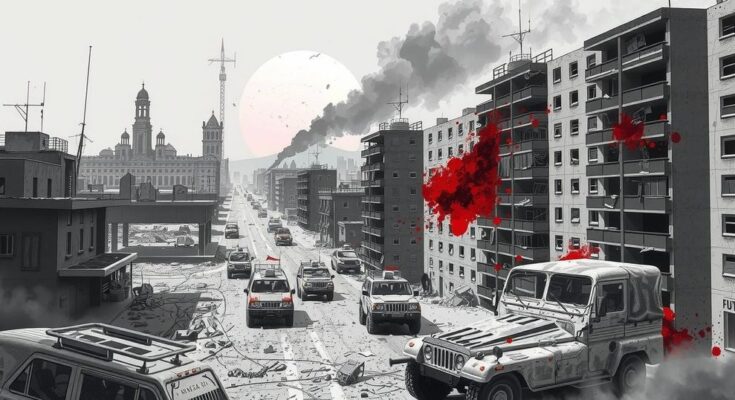The civil war in Sudan has intensified as the military battles the RSF for control of Khartoum. Notable atrocities and extensive destruction characterize the conflict. As the military reclaim territories, severe humanitarian crises persist, with citizens facing trauma, loss, and violence. Reports indicate that many RSF commanders have fled the city, leaving their lower ranks to confront military advances amid humanitarian tragedies.
The ongoing civil war in Sudan has reached a critical juncture in Khartoum, now contested between the military and the paramilitary Rapid Support Forces (RSF). The RSF has held sway over the capital for nearly two years, but military forces have begun reclaiming territory, positioning themselves around the city. The conflict, while potentially favoring the military with a victory in Khartoum, is not projected to resolve the war entirely.
The BBC documented extensive destruction in areas recently recaptured by the military. As the reporters navigated through Khartoum, they observed numerous damaged buildings with signs of violence, including burnt structures and bullet-riddled facades, a scene indicative of the chaos engulfing the city. Residents described the fresh trauma of the conflict, illustrating the psychological toll on the populace.
Haj Yusuf, a district in Khartoum, experienced horrifying acts of violence by retreating RSF fighters. One resident recounted how her sons were attacked, leading to the death of a friend and the eventual demise of one of her sons due to inadequate medical treatment. The experience has left the citizens deeply traumatized, with one survivor expressing her hopelessness amid the persistent violence.
In a different account, Asma Mubarak Abdel Karim detailed the terror of being confronted by RSF soldiers, who accused civilians of supporting the military and subsequently committed acts of extreme violence against women. Reports have emerged of various atrocities, prompting criticism of the RSF from international authorities, particularly regarding issues of sexual violence and human rights violations.
Despite the ongoing conflict, rumors indicate that many RSF commanders have fled Khartoum, leaving lower-ranking soldiers to face the military’s advances. The army is implementing strategies to convince remaining RSF fighters to retreat peacefully, even using drone-printed leaflets to communicate with affected populations.
Reports from various neighborhoods showcased the aftermath of extensive looting and destruction, with some residents returning only to confront the remnants of their former lives. Survivors, like Hussein Abbas, conveyed the deep emotional scars inflicted by these experiences. Nonetheless, despite feeling a sense of safety as military control strengthens, many people acknowledge the significant suffering that continues to affect their lives.
In summary, the battle for Khartoum exemplifies the brutality of Sudan’s civil war, as the military seeks to reclaim control from the RSF. The destruction and psychological trauma endured by residents highlight the grave realities of war. While the military’s advances may suggest a temporary shift in power, the humanitarian crisis remains dire, underscoring the ongoing suffering of the Sudanese people caught in this relentless conflict.
Original Source: www.bbc.com




